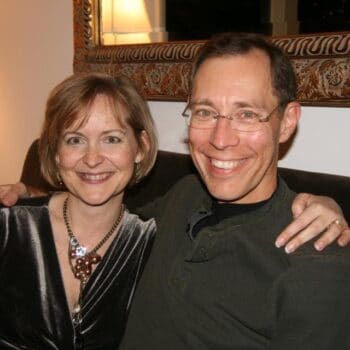Dr. Renée Harmon

The caregiving principle “Let’s do it together,” reminded us both that he could still be a vital, contributing member of our family. When I applied it to daily tasks, vacations, big life events, and even play, he was able to retain a sense of his place within our family.
February 1, 2021
Dr. Renée Harmon was a caregiver to her husband and the author of “Surfing the Waves of Alzheimer’s.”
Loving and caring for a person when he or she is extremely vulnerable, especially after loving them for decades prior, is a gift that’s difficult to appreciate in the moment sometimes. But experiencing life, illness, and death with my husband Harvey will be a touchstone event for the rest of my life. We truly did all of life together.
The caregiving principle “Let’s do it together,” reminded us both that he could still be a vital, contributing member of our family. When I applied it to daily tasks, vacations, big life events, and even play, he was able to retain a sense of his place within our family.
When Harvey was diagnosed with Alzheimer’s in 2010 at the age of 50, the dynamics of our relationship morphed overnight as I became a full-time solo physician in what was once our shared medical practice. Harvey was forced to retire and stay home. He took over most of the domestic tasks, but I knew that, over time, I would be taking on more and more of them.
At first, as the household chores began to shift my way, I would find ways to get them all done. Because it frustrated me to watch him try to do his simple tasks, I found that it was much easier to do them myself. He could make a mess of certain chores, requiring me to redo them anyway. One day I realized that I had completely removed his ability to contribute to our family. I had taken over, hired out, or reassigned to our daughters all the tasks he used to do.
The household needed to run smoothly. There were so many moving parts, but I was treating my husband as one of the burdens I had to shoulder rather than the life-partner that he had always been. We had always done life together. We married in medical school as we pursued family medicine at the same residency. We worked alongside as physicians afterwards while raising our children together. There had to be a better balance in the new chapter of our lives.
When I mentioned my concerns to my best friend, Nancy, we worked out a plan that would address many of my dilemmas. Offering to come cook dinner with Harvey once a week, she would arrive with recipes. They would then shop at the grocery store, and come back to prepare a meal together. His duties were to open cans, chop vegetables, and stir. This was a beautiful arrangement. Harvey had Nancy to interact with as he helped prepare a meal for our family, and because she stayed afterwards, I got to eat dinner with my friend and my husband.
I began to model this approach when I prepared meals, and included Harvey. I started to include him in other simple tasks, such as laundry. He had previously ruined some of my clothes, so I had taken over. Now, saying, “Let’s do it together,” I asked him to dump the sorted laundry into the washer. I measured out the detergent and got him to pour it in. He moved the clothes to the dryer, and I checked the settings. We then folded the loads together.
One of the last independent chores Harvey lost the ability to accomplish was taking care of our family dog. Instead of taking it on myself, I would say, “Let’s do it together,” and guide him in filling the food and water bowls.
Eventually, Harvey was unable to offer any real help, but I continued to insist, “Let’s do it together,” even if he was just by my side, watching. I hope that it gave him a sense that he was contributing.
I incorporated this mantra in play as well, asking Harvey to dance with me, or play catch, or take a walk. I took into consideration his abilities when planning family vacations so that he could be an integral part of them. He went with me to weddings and funerals. I was always by his side to help navigate conversations.
Harvey and I shared a life together for 35 years, the last eight of which were filled with grief, loss, pain, and anger, but also a level of love that I had never experienced before. At the age of 24, when I pledged to love him “in sickness and in health,” I had no comprehension of what illness and caregiving would bring to our relationship. Journeying with Harvey through his dementia brought us both deep enrichment in our lives together.